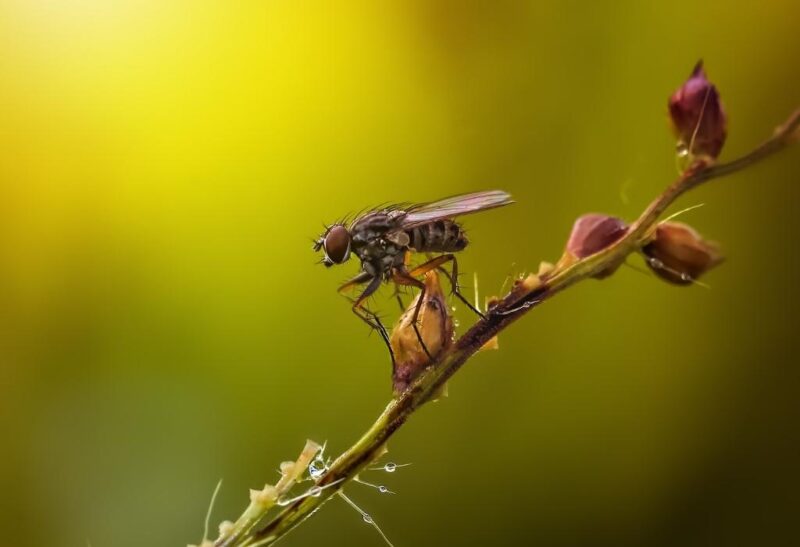Flies are common pests. You can find them anywhere – in your house, in your office, and even in the park. And if you have a problem with flies, you know that the first thing you have to do to get rid of them is to know what they’re attracted to. And you’ll discover all about that in this article.
The common housefly is known to feast on decaying matter and feces, while fruit flies prefer to munch on fruits and other sugary treats. They are also known to drink human sweat and feed on flakes of dry skin.
With that in mind, you might be curious about other things. Does finding flies at home mean that your home is dirty? And if so, how do you get rid of them? Continue reading for the answers.
Table of Contents
How Do Flies Eat?
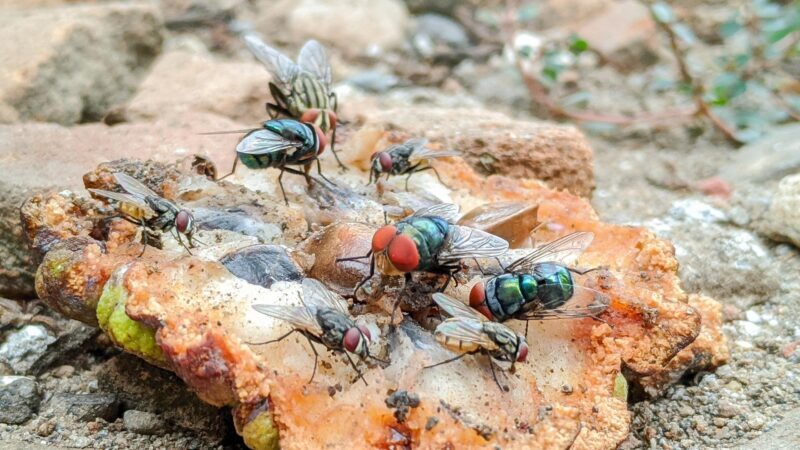
Flies survive on a purely liquid diet. Like most insects, flies have soft mouths that look like elongated feeding tubes. Interestingly, they do not have teeth, and that makes them unable to bite and chew their food. Because of their mouthpart’s anatomy, they rely on sucking liquids for sustenance.
But with that in mind, you may be curious as to how they manage to eat solid food. After all, you see them landing on rotten sandwiches, carcasses, and fruits. How do they manage to eat it?
The answer lies in their saliva. Their saliva contains enzymes that are capable of dissolving solid food. Once dissolved, they then suck it through their tube-like mouthparts.
In some instances when the food remains indigestible, flies even repeat the process and bring back the swallowed food up to their mouths and re-swallow it until the food is completely dissolved.
Do Flies Eat Poop?
Flies do eat poop. They are notoriously infamous because of their unhygienic choice of food, which include eating animal excrement.
Flies are attracted to the bacteria, protein, fat, and other substances found in feces. As peculiar as it seems, this is where flies get their nutrition from. They also love the moist nature of poop since this makes it easier for them to suck their food.
What Is a Fly’s Favorite Food?
When you look at a fly, it seems that it will eat almost anything. However, flies do have favorite foods, and it largely depends on the species of flies they belong to.
Two of the most common flies are the house fly and the fruit fly. The housefly’s favorite food includes fecal matter and decaying matter. This includes dead animals and food leftovers thrown into the garbage.
On the other hand, the fruit fly prefers feeding on overripe fruit and other sugary food like sodas and desserts.
What Do Flies Eat on Your Skin?
In some instances, a fly would land on your skin. Fortunately, it does not bite nor feed on human blood, so that makes it less worrying. But, flies do eat something off of your skin – your sweat and dead skin.
Interestingly, flies do not only do this to humans. They will also land on animals to feed off their dead skin. However, since most animals have a layer of fur or feathers, they are not as likely to do so.
How Long Can a House Fly Go Without Food or Water?
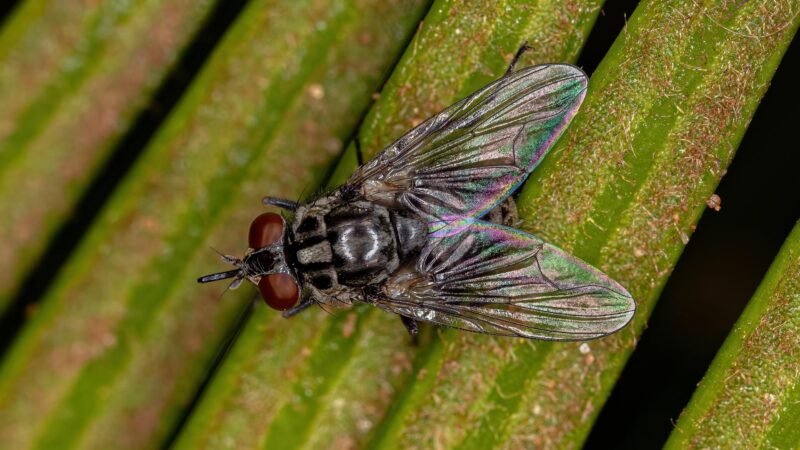
Without food or water, a housefly can survive for around two to three days. It is also worth noting that a house fly trapped indoors may only survive for around two weeks due to stress – even if it has access to food and water.
This is especially true if the indoor location is air-conditioned since flies are not able to withstand cold temperatures.
How Dirty Is a Fly?
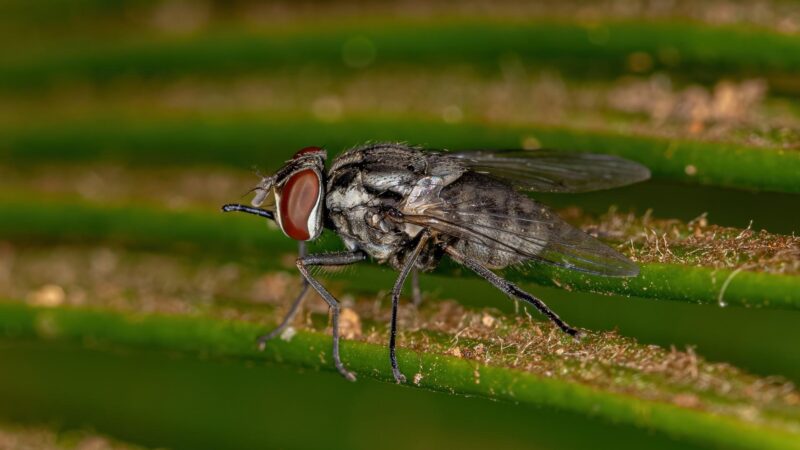
Because flies feed on what humans consider unhygienic, there’s no denying that flies are quite dirty. They frequently land and feed on fecal matter and rotting carcasses, and that makes them carriers of several disease-causing pathogens.
But, what’s interesting is that flies clean themselves. Studies reveal that flies have a cleaning behavior that allows them to get rid of bacteria and other microorganisms from their bodies.
However, they cannot get rid of all of the pathogens on their bodies, so some of them still remain on their legs and feet. Because of this, they are still considered quite dirty.
Do Flies Mean Your House Is Dirty?
Having houseflies in your house does not exactly mean that your entire house is dirty. It only means that there are items in your house that have attracted flies.
Bear in mind that flies love eating rotting material, and that includes the food you have thrown into the garbage. This is why flies are often seen flying around trash cans and waste disposal bins.
So to avoid getting flies at home, make sure to throw out rotting or overripe fruits and vegetables – and make sure that trash bins have covers to keep them from attracting flies.
Do Flies Poop on Your Food?
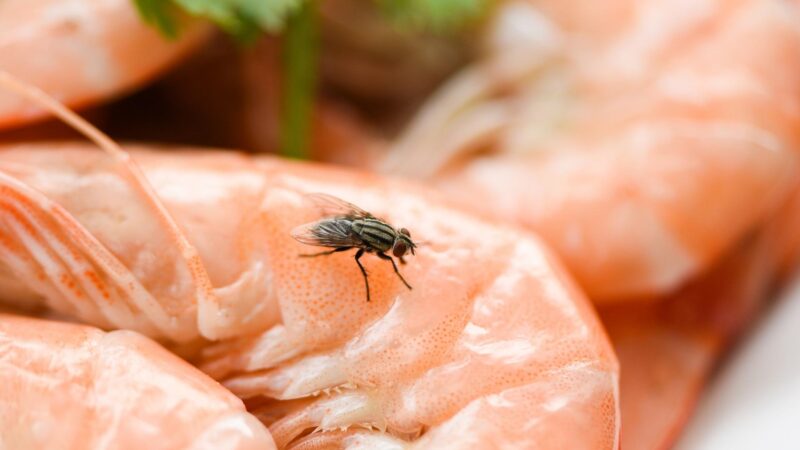
There is a chance that flies poop on your food. Keep in mind that flies survive on a liquid diet. As a result, their food tends to pass quickly through their body, and that makes them poop frequently. Since flies are not picky as to where they poop, they may end up doing it on your food.
Does a Fly Poop Every Time It Lands?
A fly does not poop every time it lands. As earlier established, flies poop quite frequently – but that doesn’t mean that they do it every time they land. Sometimes, they land only to search for food nearby.
Can You Eat Food After a Fly Lands on It?
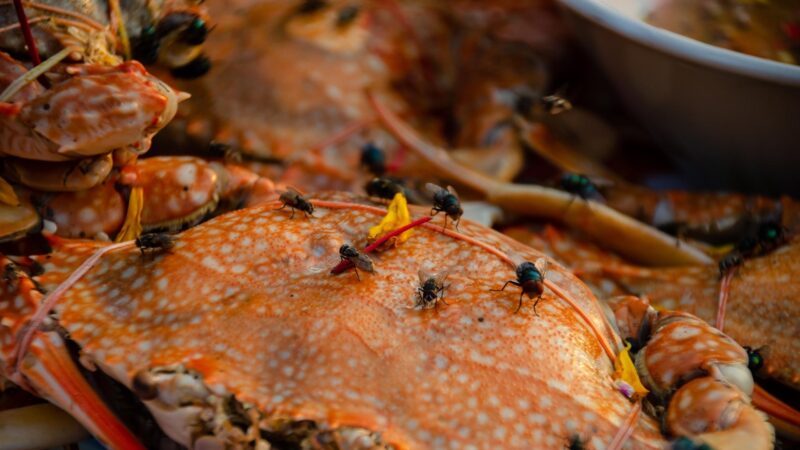
While it may seem unhygienic to eat something after a fly has landed on it, it has been observed that eating food that has been touched by a fly does not always cause diseases. This is especially the case if the fly barely touched the food and the person eating it is quite healthy.
However, if the fly has lingered on the food long enough, it’s best to avoid eating it. In this case, the fly may have already released its saliva onto the food to eat it. Or worse – it may have already vomited and re-swallowed the food, or has pooped on it. In this case, this food is sure to contain disease-causing pathogens from the fly.
Signs You Have a House Fly Infestation
Finding one or two house flies inside your home does not necessarily mean that there is an infestation. These may have just flown through your home in search of food. The following are the surefire ways to determine whether there is a house fly infestation in your home:
- You can always find several flies hovering above waste disposal bins or trash cans. Even after you have emptied them, a number of flies will fly over them again after a while.
- There is the presence of larvae or fly eggs around leftover food, garbage bins, and other similar areas.
- You can find dark brown oval-shaped pupae around the house, particularly in corners or hidden under trash bins.
How to Prevent an Infestation?
Preventing an infestation is much easier than getting rid of one that has already started. The following are some of the ways you can prevent a fly infestation:
- Get rid of items that flies will consider as food. For example, check your fruit basket if there are overripe or rotting fruits there. If there are, then it’s best to throw them out as soon as possible to keep them from attracting flies.
- Make sure your garbage bins or trash cans have covers. Open trash cans are more likely to attract flies since their food source is easily accessible.
- Have fly nets installed over windows and vents. These nets will prevent flies from getting into your home even with the windows open.
- Clean your house regularly. By cleaning your house often, you are getting rid of dirt and grub that can attract flies into your home. Cleaning also gets rid of eggs that have already been laid there.
What Eats Flies?
Flies are tiny insects that are located at the bottom of the food chain. As such, they are often hunted down by predators – ranging from amphibians to birds.
- Frogs. Frogs are among the biggest predators of flies. While they largely feed on insects, their biggest source of nutrition is house flies. Frogs quickly trap flies with their long and sticky tongues, and would then eat them soon after.
- Lizards. Reptiles like lizards also love feeding on flies. Like frogs, they also use their long and sticky tongues to catch and eat their prey.
- Spiders. Spiders are also known for eating insects, and flies are no exception. If an unfortunate fly gets trapped in its web, then the spider won’t hesitate to feast on it.
- Birds. Birds also love eating flies. The list includes chickens, swallows, and warblers, to name a few.
What Smells Do Flies Hate?
- Minty scents. Minty scents like peppermint and spearmint are known to repel flies because of their clean smell. Since flies feed on rotting food and excrement, the smell of these plants is the opposite of what they are looking for.
- Citronella. Citronella is known to repel a variety of insects – including flies. The reason behind this is that citronella is capable of masking the smell of garbage, so flies will think that food is not available whenever they smell citronella.
- Cinnamon. Like citronella, cinnamon has a strong spicy scent that effectively masks the putrid smells that flies are looking for.
- Basil. While basil is an aromatic herb, its strong smell is something that flies seem to be deterred by.
Why Do Flies Rub Their Hands?
Flies rub their hands when they are cleaning themselves. As earlier discussed, flies have a cleaning behavior – and it involves rubbing their hands and legs together. So, the next time you see a fly rubbing its hands, know that it is actually getting rid of bacteria from its body.
How to Get Rid of Flies Naturally?
- Use lemongrass oil. Studies have shown that lemongrass is effective at keeping flies away. Simply dilute lemongrass oil in water and spray it near house entrances like doors and windows. You can also spray it over garbage bins to draw flies away.
- Diffuse peppermint or spearmint oil. Peppermint and spearmint naturally wards flies away because it masks the smell of garbage or overripe fruit. The best part about it is that it smells great – so your home will always smell minty-fresh.
- Plant basil. Basil is a fragrant herb that has a strong smell that flies hate. Fortunately, basil is easy to plant, so having some in your garden or near your windows will keep flies away.
Flies have developed a bad reputation for feeding on rotten food and bodily excrement. Because of this, they are known to carry a plethora of diseases – which is why a fly infestation is never a good thing. Fortunately, by determining what they love to eat, you can also get rid of them easily. And lucky for you, this article details everything you need to know about these pesky pests.
List of Sources
Potter, M. F. (1994). Fruit Flies. Entomology at the University of Kentucky.
Questions and Answers about Flies and Ants. (2014). PennState Extension.
Print, K. (2016). Should I throw away food once a fly has landed on it? The University of Sydney.
Palavalli-Nettimi, R., Theobald, J. (2021). Curious Kids: Do flies really throw up on your food when they land on it? Florida International University.
Baldacchino, F., et al. (2013). The repellency of lemongrass oil against stable flies, tested using video tracking. Parasite.
